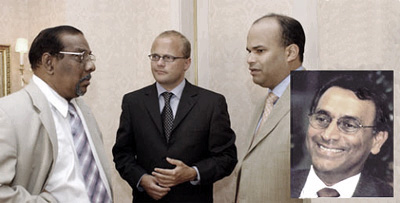
| 02/01/2005 - The Sunday Leader | |||
| Peace process takes back seat | |||
 |
|||
|
Anton Balasingham, Vidar Helgessen and Milinda Moragoda during the high profile peace talks last year and Secretary General, Peace Secretariat, Jayantha Dhanapala While the tsunami devastation has pushed back the urgency to recommence peace negotiations, the Liberation Tigers of Tamil Eelam (LTTE) expects the government to implement its ISGA proposal for the commencement of rehabilitation work in the north and east. There is no gainsaying the peace process will take a back seat following the devastation not just in the north east but also the south. |
|||
Given the loss of human life and destruction, neither the LTTE nor the government will in the foreseeable future be in a position to go to war. Neither will there be an urgency for resuming peace talks.
But the LTTE may well use the opportunity to justify their demand for an ISGA claiming the government was turning a blind eye to the ravaged north east with no relief flowing their way. If LTTE accepts For, if the LTTE was to accept the government offer to work together, it will necessarily blow the bottom off their claim for an ISGA. The government for its part too knows this only too well and has intensified their call for the LTTE to jump aboard. The question that arises however is whether the government would use the aid flowing in only to rehabilitate the areas affected by the tsunami and not the war ravaged areas which have a longer history of suffering. That probably would be the pitch the LTTE would use to intensify their call for the immediate implementation of the ISGA by pointing out the irony to the international community. The LTTE has in fact observed the need for the ISGA to receive direct foreign aid for the rehabilitation work under its control. LTTE's Trincomalee Political Wing Head, S. Elilan told The Sunday Leader that any form of aid for the rehabilitation work in the north and east should be directly handed over to the province. However, he observed that it does not mean the LTTE would not cooperate with the government on rehabilitation work. |
|||
Elilan pointed out that most of the immediate relief items being brought to the north and east by NGOs are robbed on the way by highwaymen, making it a tedious process for the donors as well as those affected in the north and east.
"Therefore, any rehabilitation aid should come directly," he said. Elilan observed that officials from humanitarian agencies or even government officials involved in rehabilitation work could enter LTTE controlled areas after receiving permission from the LTTE political office in Kilinochchi. Even aid could be channelled through the same office, he said. However, he pointed out that at this juncture priority is with providing relief to those affected irrespective of race or religion. Also speaking to The Sunday Leader, Secretary General, Peace Secretariat, Jayantha Dhanapala said that priority has now been given to providing humanitarian aid for the areas affected by the tsunami in the north and east. Recommencement of negotiations The recommencement of the peace negotiations according to Dhanapala would have to wait till the relief and rehabilitation programme is underway. The recommencement of peace negotiations, which has been on stalemate for over an year now, has been on the centre stage till the tsunami. Efforts made by the Norwegian facilitators to restart the talks have so far been unsuccessful with the LTTE rejecting the government's latest agenda for talks, insisting talks should commence based on the ISGA. The Secretariat for Coordinating the Peace Process (SCOPP) has said that it had been reaching out to the LTTE Peace Secretariat through the assistance of the Sri Lanka Monitoring Mission (SLMM) to ascertain the essential items required for urgent humanitarian relief since December 26. On December 27, Dhanapala had conveyed the offer of government assistance to Secretary General, LTTE Peace Secretariat, S. Puleedevan. |
|||
SCOPP further says that on December 28, the government's offer to render all possible assistance to the people of the north and the east, without discrimination, was conveyed in a letter sent by the Secretary to President, W. J. S. Karunaratne to Head of the LTTE Political Division, S. P. Tamilselvan.
Effective delivery |
|||